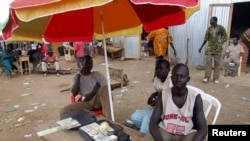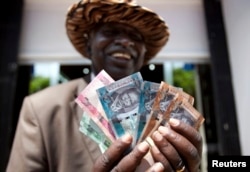The South Sudan government is cracking down on black market money changers to try to prevent the South Sudanese pound from falling any further against the U.S. dollar.
A combined force of police officers, military and national security service operatives were seen moving through several Juba markets in the past week.
One money changer, who prefers to remain anonymous for safety reasons, said the crackdown will deny him his only source of revenue.
“I got people deployed at our shops, so we have to take off. We don’t know what is going to happen, but it has stopped our business,” he told South Sudan in Focus.
The illegal money changer said he has no other livelihood.
“This business is the way of survival these days. You buy and sell and get a small profit for supporting the family,” he said.
Bank releases more US dollars
Last week, the Central Bank of South Sudan said it would inject more U.S. dollars into the economy to prevent further devaluation of the pound. The U.S. dollar now exchanges for 250 South Sudanese pounds, up from 215 South Sudanese pounds a week ago on the black market.
Despite the crackdown, traders and buyers continued to haggle over prices for vegetables, fruits and other basic commodities in Juba markets.
Some traders say they are not concerned about the crackdown, which includes arresting money changers, but desperately want to see a reduction in skyrocketing commodity prices.
Value of pound drops
Janet Kiden, who sells artificial hair and clothes in Juba’s customs market, said the drop in value of the South Sudanese pound against the U.S. dollar is what has caused repeated price hikes.
“I want it to drop down because I have no husband and no one to help us. You need to buy food,” Kiden told South Sudan in Focus.
Juba’s deputy mayor Samir Khamis Suleiman said officials agreed to carry out the crackdown in a joint meeting between the military, police, national security agents, the finance ministry and Juba City officials.
“On Wednesday, they said they don’t want this issue of buying dollars,” he told South Sudan in Focus.
Violators will be arrested
South Sudan national police spokesman Brig. Gen. Daniel Justine acknowledged there have been previous crackdowns, but the black market dealing continued. This time around, he said, violators will be arrested.
“We have been doing this from time to time, but this time we have changed our way of handling it in terms of deploying forces in those areas, especially in Juba town and the custom markets. So all violators will face the law,” Justine told South Sudan in Focus.
Justine advised black market money changers to get a license so they can legally continue in the business of exchanging currency.

